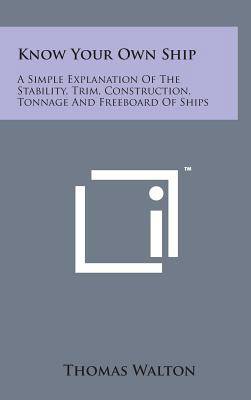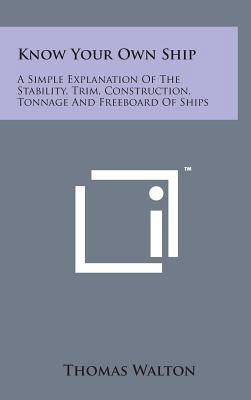
En raison d'une grêve chez bpost, votre commande pourrait être retardée. Vous avez besoin d’un livre rapidement ? Nos magasins vous accueillent à bras ouverts !
- Retrait gratuit dans votre magasin Club
- 7.000.000 titres dans notre catalogue
- Payer en toute sécurité
- Toujours un magasin près de chez vous
En raison de la grêve chez bpost, votre commande pourrait être retardée. Vous avez besoin d’un livre rapidement ? Nos magasins vous accueillent à bras ouverts !
- Retrait gratuit dans votre magasin Club
- 7.000.0000 titres dans notre catalogue
- Payer en toute sécurité
- Toujours un magasin près de chez vous
Know Your Own Ship
A Simple Explanation of the Stability, Trim, Construction, Tonnage and Freeboard of Ships
Thomas Walton
Livre relié | Anglais
66,45 €
+ 132 points
Format
Description
""Know Your Own Ship"" by Thomas Walton is a comprehensive guide that provides a simple explanation of the stability, trim, construction, tonnage, and freeboard of ships. The book is a must-read for anyone interested in ships, from shipbuilders to sailors and marine engineers. The book is divided into several chapters, each dealing with a specific aspect of ship design and construction. The first chapter introduces the reader to the concept of stability and explains how it is achieved in a ship. The chapter covers topics such as the center of gravity, center of buoyancy, and the metacentric height. The second chapter focuses on the trim of a ship, which refers to its balance in the water. The chapter explains how the trim is affected by the distribution of weight on the ship and how it can be adjusted to improve the ship's performance. The third chapter deals with the construction of ships and explains the different types of materials used in shipbuilding, such as wood, steel, and aluminum. The chapter also covers the different types of shipbuilding techniques and their advantages and disadvantages. The fourth chapter covers the tonnage of ships, which is a measure of their size and carrying capacity. The chapter explains the different types of tonnage, such as gross tonnage and net tonnage, and how they are calculated. The final chapter deals with the freeboard of ships, which is the distance between the waterline and the main deck. The chapter explains how the freeboard is determined and how it affects the ship's stability and safety. Overall, ""Know Your Own Ship"" is an essential guide for anyone interested in ships and their design and construction. The book is written in a clear and concise style, making it accessible to readers of all levels of expertise.This Is A New Release Of The Original 1899 Edition.This scarce antiquarian book is a facsimile reprint of the old original and may contain some imperfections such as library marks and notations. Because we believe this work is culturally important, we have made it available as part of our commitment for protecting, preserving, and promoting the world's literature in affordable, high quality, modern editions, that are true to their original work.
Spécifications
Parties prenantes
- Auteur(s) :
- Editeur:
Contenu
- Nombre de pages :
- 352
- Langue:
- Anglais
Caractéristiques
- EAN:
- 9781498150217
- Date de parution :
- 07-08-14
- Format:
- Livre relié
- Format numérique:
- Genaaid
- Dimensions :
- 152 mm x 229 mm
- Poids :
- 639 g

Les avis
Nous publions uniquement les avis qui respectent les conditions requises. Consultez nos conditions pour les avis.






